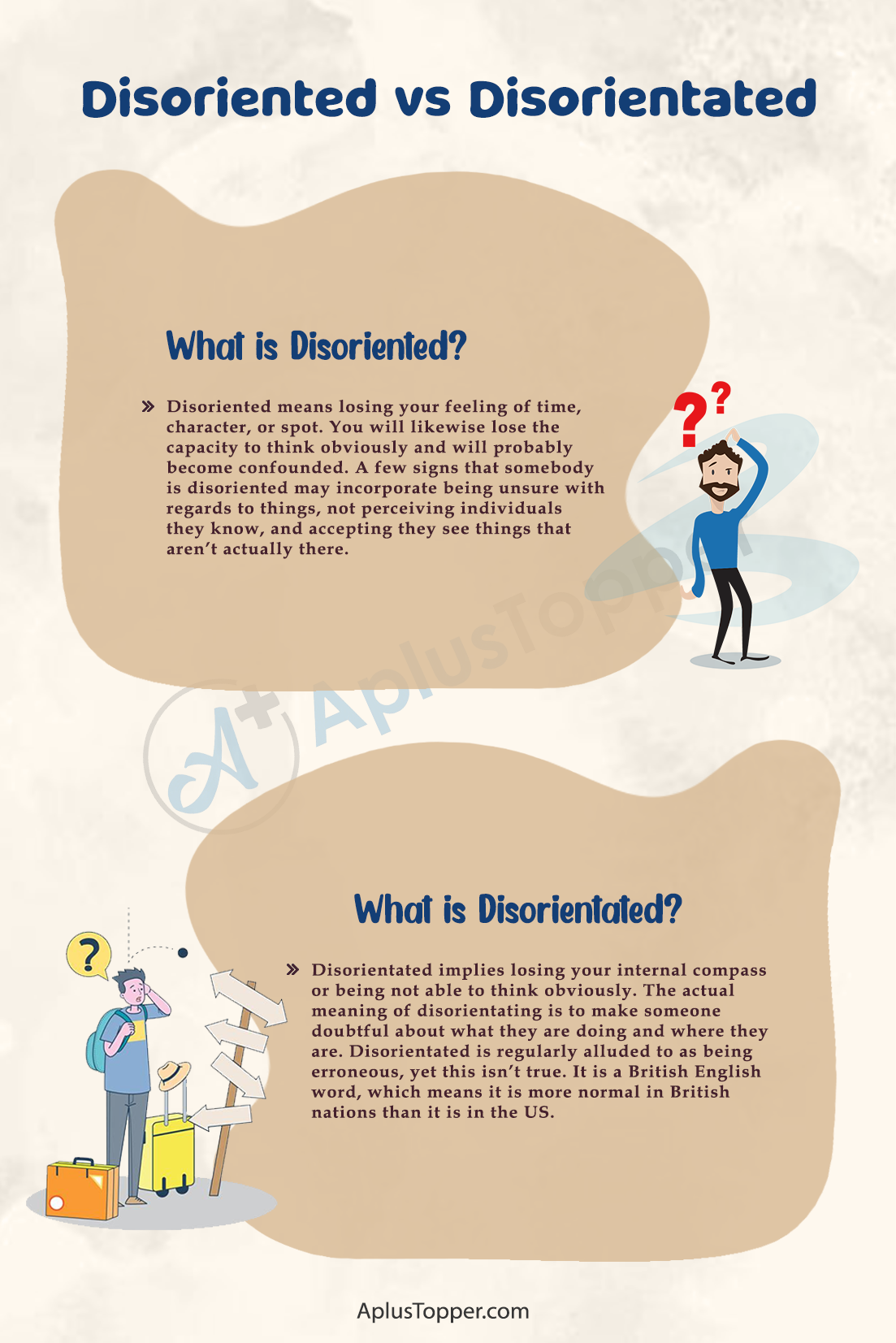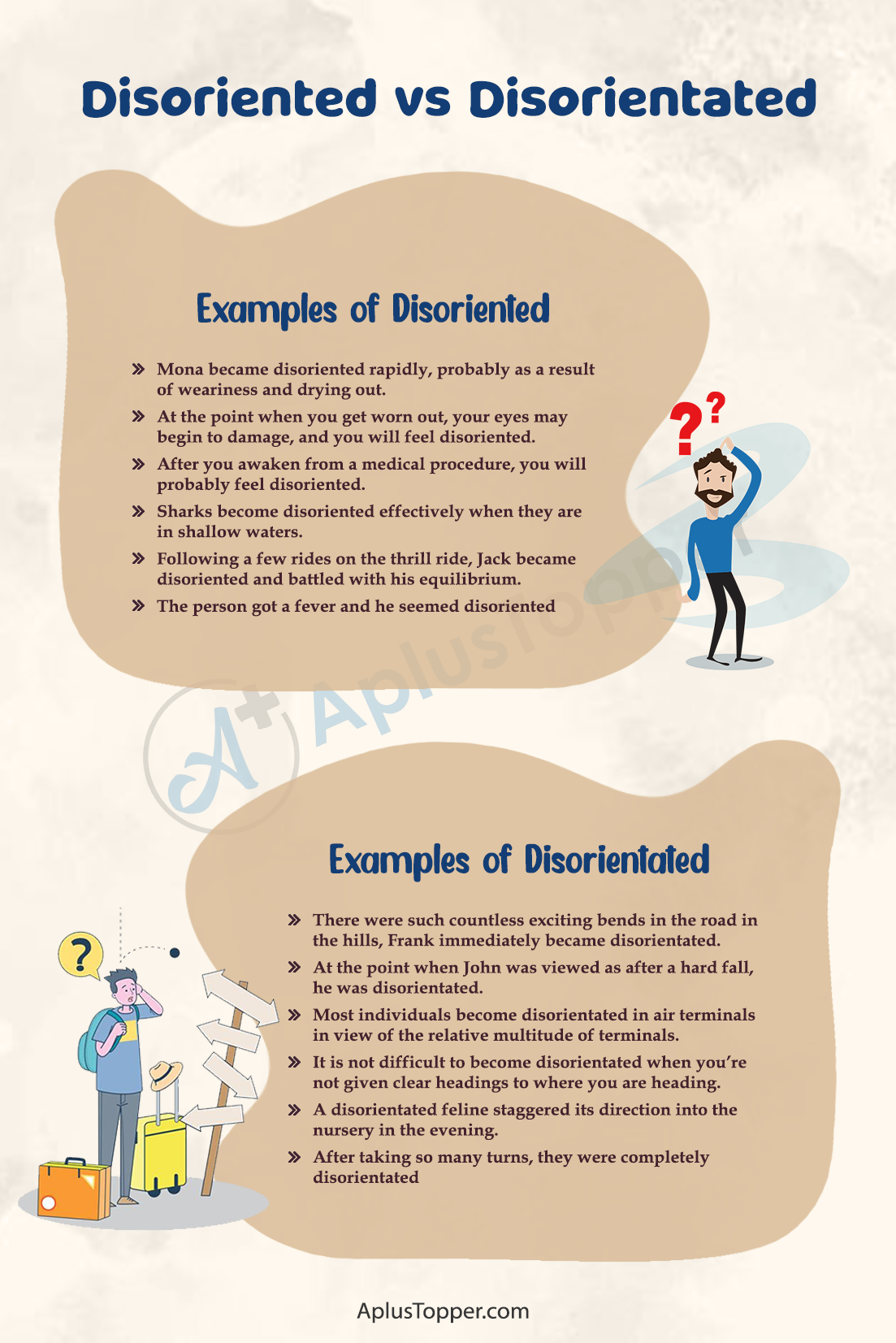Disoriented vs Disorientated: The English language is loaded with words that are spelled comparably with comparative definitions. One incredible illustration of this is the words disoriented and disorientated. The two words are similarly as comparable in spelling as they are in importance, yet how would you realize when to utilize which word? Would they be able to be utilized instead of one another?
Disorientated is frequently considered to be an inappropriate word, however, it isn’t. It is exactly the same thing as disoriented, however, it is utilized in the British English language rather than the American English language. That implies both of these words are legitimate, contingent upon where you are.
What is Disoriented?
Disoriented means losing your feeling of time, character, or spot. You will likewise lose the capacity to think obviously and will probably become confounded. A few signs that somebody is disoriented may incorporate being unsure with regards to things, not perceiving individuals they know, and accepting they see things that aren’t actually there.
One may become disoriented with the utilization of medications or liquor, or it tends to be an indication of a basic ailment. In case you are feeling disoriented and you haven’t been drinking, you should contact a specialist to talk about what the issue may be.
Examples of Disoriented
- Mona became disoriented rapidly, probably as a result of weariness and drying out.
- At the point when you get worn out, your eyes may begin to damage, and you will feel disoriented.
- After you awaken from a medical procedure, you will probably feel disoriented.
- Sharks become disoriented effectively when they are in shallow waters.
- Following a few rides on the thrill ride, Jack became disoriented and battled with his equilibrium.
- The person got a fever and he seemed disoriented

What is Disorientated?
Disorientated implies losing your internal compass or being not able to think obviously. The actual meaning of disorientating is to make someone doubtful about what they are doing and where they are. Disorientated is regularly alluded to as being erroneous, yet this isn’t true. It is a British English word, which means it is more normal in British nations than it is in the US.
A few manifestations of being disorientated incorporate the powerlessness to center, not knowing where you are, being dubious with regards to your environmental elements, and turning out to be effectively fomented. This may leave you confounded, insane, or with a need to meander around. You would become disorientated the same way you would become disoriented. This could be from liquor, drugs, or a hidden ailment.
Examples of Disorientated
- There were such countless exciting bends in the road in the hills, Frank immediately became disorientated.
- At the point when John was viewed as after a hard fall, he was disorientated.
- Most individuals become disorientated in air terminals in view of the relative multitude of terminals.
- It is not difficult to become disorientated when you’re not given clear headings to where you are heading.
- A disorientated feline staggered its direction into the nursery in the evening.
- After taking so many turns, they were completely disorientated
Which is Correct? Disoriented or Disorientated
Both ‘disoriented’ and ‘disorientated’ have pretty much similar importance. In spite of the fact that there are many individuals who don’t care for ‘disorientated’, it is a word that has been a piece of British English for well more than 400 years. Like ‘disoriented’, the word ‘disorientated’ can be utilized to signify ‘to make somebody lose their internal compass’. It can likewise be utilized to intend to ‘befuddle’ somebody.
Maybe “disoriented” is a greater amount of a modifier, where “Disorientated” is all the more properly an action word. Remember that the most appropriate utilization of each word will rely upon where you are at when you are giving the signal. A few Americans don’t realize that disorientated is really a word, and the equivalent goes for disoriented in Britain.
Difference Between Disoriented and Disorientated
Both disoriented and disorientated are right. In any case, it is more normal in the United States to say the word disoriented and it is more normal in the British nations to say the word disorientated. That implies neither one of the words is wrong, and the two of them can be utilized.
These two words appear to have similar importance, so what makes them unique? The principal contrast between the two is the beginning. Disorientated is a British English word, while disoriented is an American English word. disoriented and disorientated can be utilized instead of one another, yet it will bode well contingent upon where you are found.

FAQ’s on Disoriented vs Disorientated
Question 1.
What is the meaning of disoriented?
Answer:
To be disoriented is to feel lost or befuddled. Individuals who are bewildered either don’t have the foggiest idea where they are on the grounds that they’ve lost their internal compass, or they don’t have a clue who they are on the grounds that they’ve lost their ability to be self-aware.
Question 2.
What are the synonyms of disoriented?
Answer:
A drift, astray, bewildered, lost, perplexed, unhinged, unsettled, discombobulated, unbalanced, all at sea, mixed-up, out-of-joint.
Question 3.
Is disoriented an adjective?
Answer:
Disoriented is an adjective word.
Question 4.
How to use disoriented in sentences?
Answer:
Examples of using disoriented are:
- Disoriented, she sat down on a chair near the hospital.
- He opened his eyes disoriented.
- I have never been so disoriented in my whole life
